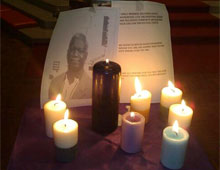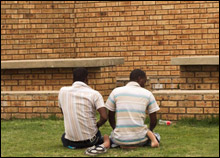HOT SEAT INTERVIEW: Transcript of ‘Hot Seat’ programme in which SW Radio Africa’s Violet Gonda talks with Professors Brian Raftopoulos, Jonathan Moyo and Economist John Robertson.
Violet: Zimbabwe is a country in crisis and many have asked what needs to be done internationally by all democratic forces and what role the regional and international community can play – now, and in the post Mugabe period. To help discuss various ideas I’ve invited three people who have at one time or another advised some of the key players in Zimbabwean politics. They are political analyst Professor Brian Raftopoulos who once acted as an advisor for Morgan Tsvangirai’s MDC, independent MP Jonathan Moyo, who was widely described as an advisor and strategist for Robert Mugabe and well known economist John Robertson. Welcome to the programme gentlemen. Now we will start with a common question, ah, well, there is no question, but there is a serious political crisis in Zimbabwe and that the economy has collapsed with inflation officially at 1 193.5 % but generally it’s understood to be much higher than that. Now obviously something must be done about Zimbabwe but what are the suggestions? Let’s start with Professor Moyo.
Jonathan Moyo: Well, the suggestions – I don’t think that the way our country is and how things are going invites suggestions, clearly what is needed is action. The first action, of course people would reasonably expect, that it must come from government – what government should do. And, the problem we have at the moment is that the government seems to be in a policy paralysis and it does not have a response. Although, I must say, the recent developments suggest that there is some international engagement which might lead to some resolution of this crisis because of the consequences of this economic meltdown. All this discussion around a possible initiative led by Kofi Annan suggests that the government now wants a way out and the question is, what it would be? There are a number of scenarios we can talk about in the course of the discussion. (Read more…)
Tue, June 13 2006 » Interviews » Leave a comment
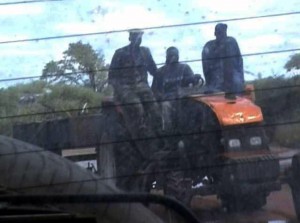
Report Cover Photo: Soldiers driving a tractor
Command agriculture has to be contextualised against a background of the collapse of agriculture since 2000, and of epidemic corruption and inefficiency not only in this sector, but throughout the government policies in Zimbabwe.
Zimbabwe has faced a food deficit for several consecutive years, and the need to regain credibility for the land invasions, as well as fears of food riots, and the desire to be less dependent on international aid for reasons of national pride and sovereignty, all provide partial motives for Command Agriculture. (Read more…)
Sat, April 15 2006 » Access to resources, Command agriculture, Human rights, Reports » Leave a comment
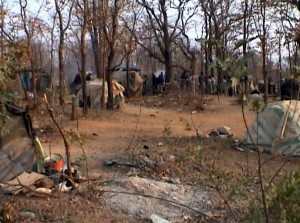
Report Cover Photo: Informal mining settlement in Matabeleland
The July UN report on the demolitions in Zimbabwe has become the definitive report on events between May and the end of June 2005. Other reports have covered in detail urban and peri-urban aspects of OM. Political analysis, assessment of the judiciary, and quantification of those affected are variously covered by other human rights reports released since July.
The current report is the first to systematically follow more than one hundred of the displaced into the rural contexts in which they now find themselves. This report focuses on events since the end of July in Matabeleland, notably Bulawayo and Victoria Falls. (Read more…)
Wed, October 19 2005 » Human rights, Operation Murambatsvina, Reports » 1 Comment
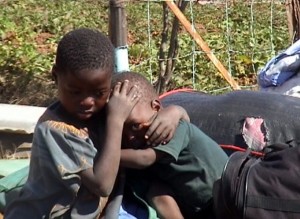
Report Cover Photo: Still taken from the Solidarity Peace Trust video, “Discarding the Filth”
On 19 May 2005, the Government of Zimbabwe began an operation labelled “Operation Murambatsvina” (OM). While Government has translated this to mean “Operation Clean-up”, or “Operation Restore Order”, the more literal translation of “Murambatsvina” is “Drive out the Filth”.
This is not the first time this Government has used “cleaning” terminology to describe a process in which Zimbabweans themselves become victims of a politically driven purge. In the 1980s, the Mugabe Government launched the now-infamous “Gukurahundi” campaign, where “gukurahundi” means “the spring rain that gets rid of the chaff from the last season”. (Read more…)
Mon, June 27 2005 » Access to resources, Human rights, Operation Murambatsvina, Reports » Leave a comment
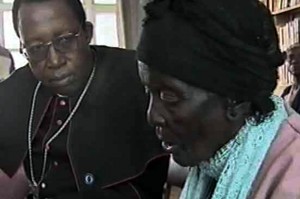
Report Cover Photo: Archbishop Pius Ncube listens to an 83 year-old woman reporting denial of access to food in Insiza District
Two teams of Church observers from South Africa entered Zimbabwe ahead of the Election 2005, to observe the election process and also in order to absorb life of ordinary Zimbabweans. The first, pre-election group consisted of four ordained priests, a church youth worker and a university professor. A seventh priest was denied entry to the country. This group had intensive interviews with key informants and travelled in Harare, Bulawayo and surrounding rural areas, attending rallies and meeting ordinary Zimbabweans. (Read more…)
Sun, May 15 2005 » 2005, Church commentators, Elections, Reports » Leave a comment




